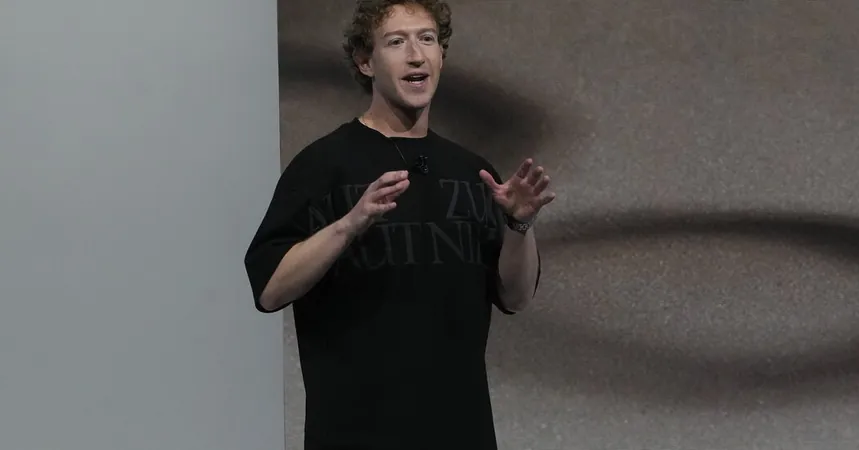
Meta's Dramatic Shift: Will Ending Fact-Checking Lead to Chaos or Free Speech?
2025-01-07
Author: Ting
Introduction
Meta, the technology giant behind platforms like Facebook, Instagram, and WhatsApp, is making a controversial decision to end its fact-checking program, a move that CEO Mark Zuckerberg claims is aimed at returning to the principles of free expression. In a recent video announcement, Zuckerberg stated, "It’s time to get back to our roots around free expression," while acknowledging that the decision may lead to an increase in harmful content across Meta’s platforms.
Background
Zuckerberg's shift comes in the wake of Donald J. Trump’s presidential victory. The tech conglomerate is clearly recalibrating its approach, having previously faced criticism for allegedly censoring conservative voices, a charge Trump made during his tenure as president. The timing of this announcement, coupled with Zuckerberg's dining with Trump at Mar-a-Lago last November and a $1 million donation to Trump’s inauguration, suggests a strategic attempt to align more closely with the incoming administration.
Political Underpinnings
Not surprisingly, the political atmosphere plays heavily into Zuckerberg's decision. Following discussions with key Trump officials, Meta's new strategy was unveiled during an appearance by Joel Kaplan—a top executive tied closely to Republican interests—on the conservative news program, "Fox & Friends." There, Kaplan noted that their fact-checking program had become "too politically biased."
Reactions from Political Figures
Many Trump allies rejoiced at the news. Senator Rand Paul celebrated the end of the fact-checking program as a "huge win for free speech." However, skepticism lingered among some Republicans; Senator Marsha Blackburn dismissed the shift as a maneuver to elude regulatory scrutiny.
Concerns over Misinformation
Concerns are already surfacing over the potential increase in misinformation and hate speech. Experts in the field of misinformation have expressed alarm that this could lead to a resurgence of the kind of unchecked rhetoric that fueled the January 6 Capitol Riot. Nicole Gill, head of the organization Accountable Tech, articulated the widespread fear that the ending of this program might reopen "the floodgates to a surge of hate and conspiracy theories."
Influence of Elon Musk
Interestingly, the influence of Elon Musk, owner of X (formerly Twitter), is also evident in Meta's pivot. Musk's approach in abolishing restrictions around free speech and instituting a user-driven content moderation model has seemingly inspired Zuckerberg to adopt a similar framework. In his announcement, Zuckerberg indicated plans to implement a Community Notes-like system for user-driven content moderation.
Operational Changes
Further reinforcing this shift, Meta announced it would relocate its U.S. content moderation and safety operations from California to Texas, a region perceived as having a more lenient view on bias, in the hopes of fostering an environment more conducive to free expression.
Zuckerberg's Ideological Shift
Mark Zuckerberg's evolution appears to mirror a more libertarian worldview. Once criticized for his hesitancy to tackle misinformation, he now champions a lighter touch toward content moderation, portraying the fact-checking system as overly constrictive. Critics, however, point out that Zuckerberg's brand of free speech may inadvertently facilitate the spread of harmful information rather than limiting it.
The Bigger Picture
Meta's decision comes after years of heavy investment in fact-checking and content moderation efforts launched in reaction to the rampant misinformation circulated during Trump’s first presidency. Zuckerberg initially faced significant backlash over Facebook's role in amplifying falsehoods associated with both the 2016 election and the COVID-19 pandemic.
Conclusion
He's seemingly grown weary of this scrutiny and critiques, particularly from the current administration, which pushed for stricter regulations on online content. As Zuckerberg now ventures to reclaim his original vision of the company, disinterested in external oversight, it raises pressing questions about accountability and the responsibility of technology platforms over the content they disseminate.
In light of these changes, Republicans see an opportunity to further champion conservative voices while critics warn of the dangers lurking within a more permissive environment. With increasing scrutiny from regulators and the repercussions of past decisions, the upcoming months will be critical in determining whether Meta's strategic pivot will ultimately benefit or harm societal discourse.
As Zuckerberg embarks on this risky new path, the world watches closely—will Meta’s back-to-roots gamble restore free expression or unleash a flood of chaos on its platforms?

 Brasil (PT)
Brasil (PT)
 Canada (EN)
Canada (EN)
 Chile (ES)
Chile (ES)
 Česko (CS)
Česko (CS)
 대한민국 (KO)
대한민국 (KO)
 España (ES)
España (ES)
 France (FR)
France (FR)
 Hong Kong (EN)
Hong Kong (EN)
 Italia (IT)
Italia (IT)
 日本 (JA)
日本 (JA)
 Magyarország (HU)
Magyarország (HU)
 Norge (NO)
Norge (NO)
 Polska (PL)
Polska (PL)
 Schweiz (DE)
Schweiz (DE)
 Singapore (EN)
Singapore (EN)
 Sverige (SV)
Sverige (SV)
 Suomi (FI)
Suomi (FI)
 Türkiye (TR)
Türkiye (TR)
 الإمارات العربية المتحدة (AR)
الإمارات العربية المتحدة (AR)